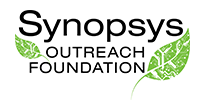The Synopsys Championship will be held March 11-12, 2020, at South Hall at the San Jose Convention Center.
Selected projects will be reviewed and checked in on March 8th
All students should plan to complete their projects and be ready for “Check In” on Sunday, March 8, 2020. Selected students will be required to check in on that day and will leave their project boards, notebooks and any prototypes after the review. Students selected for this early “Check In” will not need to come to the South Hall Convention Center on Wednesday, March 11. Their boards will be set up for them by SCVSEFA volunteers, so they just need to show up for the judging on Thursday, March 12.
Students selected for early check in will be notified about two weeks prior to the fair and are expected to check in on March 8 at a specified time in the 9 AM – 2 PM time frame. (Location: Santa Clara University).
The Society for Science and the Public (SSP), the organization that administers ISEF and all affiliated fairs, has enhanced the ethics statement on Form 1B that is signed by all participating students and their parents/guardians. SSP has provided additional guidance for ethical behavior. After careful consideration the Board of Directors for SCVSEFA has chosen to focus on this aspect for the 2020 Synopsys Championship, and a more thorough check of project documentation and appropriate attribution on the poster board is one way to achieve this.
Overall, schools can expect to have approximately 5-10% of their projects selected for early review. Special focus will be on projects that required SRC pre-approval, and those in the computational biology and software engineering fields of study. The student’s board should contain only the data that the student generated, and any additional information should be correctly attributed.
Consequences for violating SSP’s ethics and rules are listed on our website (rule #2). Teachers may also be held accountable for rules and ethics violations if they have participated in or supported the violations.
Continuing Improvement
Our goal is to improve the experience of participation in the Synopsys Championship. In 2020 we will focus on compliance with the ethics statement on Form 1B, the Approval Form that is signed by all students and parents/guardians. The statement aligns with the expanded 2020 ISEF ethics statement. Additionally we will require students and parents to sign an additional ethics form which will be collected at project check-in.
Field of Study for Behavioral Science removed
The SCVSEFA Board has decided to remove Behavioral Science as a field of study (projects that looked at the effects of various things on human participants). Reasons are that they are often of poor quality, typically have insufficient participants to see an effect and they require enormous amounts of time for the IRB and administrative personnel to review and manage. We also have problems recruiting judges with expertise to review these projects. We apologize for any inconvenience.
Students who are developing an app or have an engineering project that builds a device that needs to be tested may still do so if they follow all the rules for human participants. These projects need pre-approval by the SRC.
Judging changes
- Project Notebooks are required for High School (Grade 9 to 12) and highly recommended for Middle School (Grade 6 to 8) projects. For software projects, logs of results and dates should be incorporated into the notebook as work progresses. README documents, GitLab/Github logs or SVN/Git revision logs can be used in the project notebook using Google style or equivalent.
- The brief oral project summary by student(s) during interviews with judges should be no more than one to two minutes long without charts or a formal presentation. This will leave most of the interview time for questions from judges.
- The Category Judging Criteria have been revised to emphasize independent work, project understanding, and clarity when answering judge’s questions.
ISEF changes for 2020
The International Science & Engineering Fair will be held in Anaheim, CA, May 10-15, 2020. ISEF is no longer sponsored primarily by Intel, and the Society for Science is actively seeking new sponsors.
ISEF Rule Changes for 2020 are summarized on the web site for International Rules for Pre-College Science Research.
These include an Expanded Ethics Statement:
o Addresses integrity, legality, respect for confidentiality and intellectual property, and stewardship of the environment.
o Student researchers, as well as adults who have a role in their projects, are expected to maintain the highest ethical standards.
Application limits for teachers
Teachers with 1 category award-winning project in 2019 may sponsor 4 projects instead of 8 in 2020. This change is necessary because the Synopsys Championship significantly increased the number of Honorable Mention Awards beginning in 2019.
| # projects that won category awards in prior year | # sponsored projects allowed this year |
|---|---|
| 0 | 4 (also applies to new teachers) |
| 1 | 4 |
| 2 | 8 |
| 3 | 8 |
| 4 or more | 12 |
Application limits for schools
Some schools have a science club or equivalent that meets less frequently than a research class but where guided research projects are encouraged. Upon request to the Scientific Review Committee (src@science-fair.org), a teacher may be granted up to 20 project slots for such a class or club.
2019 rule changes are still in effect
- As in 2019, for every application from a student at a participating school, a teacher’s signature is required on Form 1. If the teacher is not the Adult Sponsor of the project, he/she may sign at the bottom of Form 1 below the signature of the Adult Sponsor. The teacher’s signature indicates that the project is included in the per-teacher and per-school limits.

